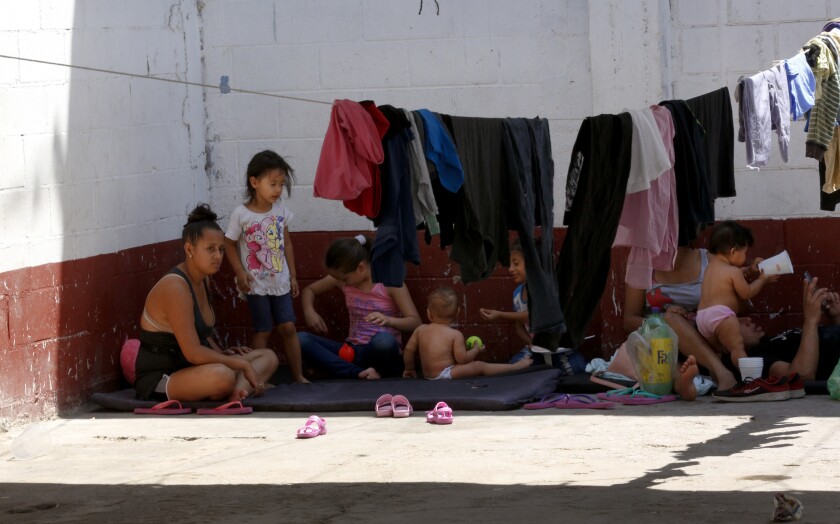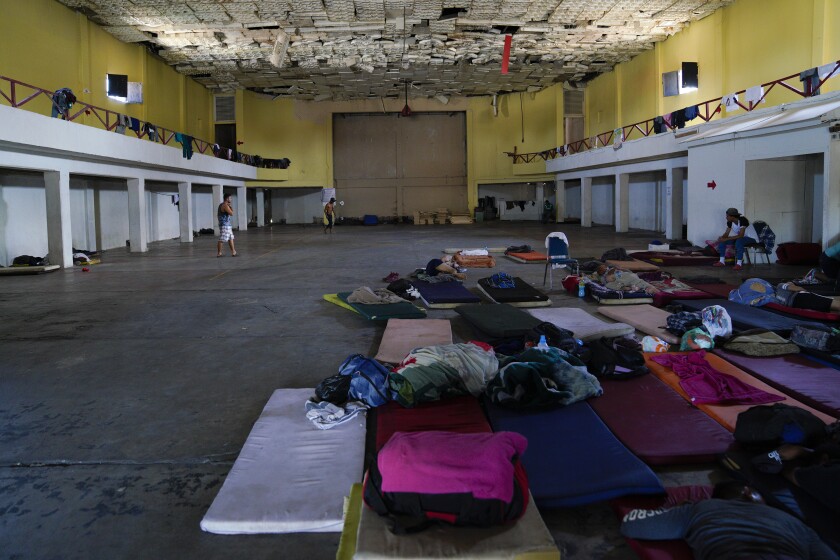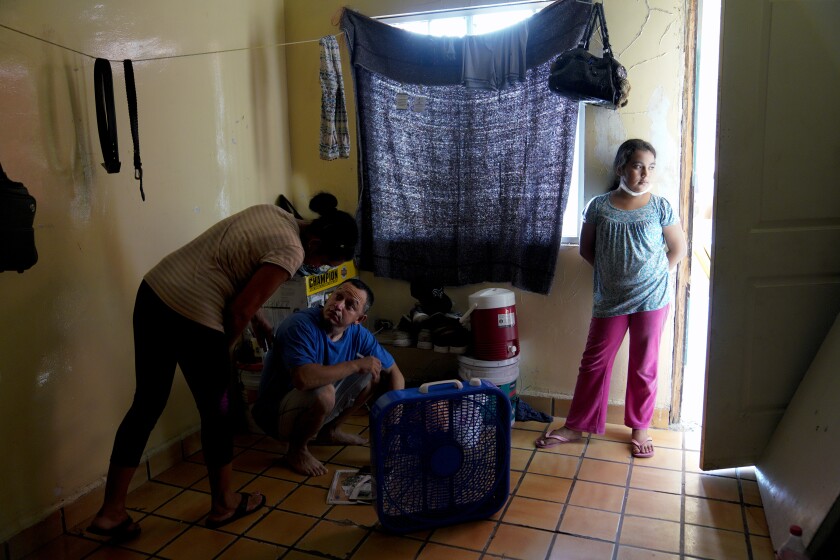
Click here to view the original news story.
With little oversight and almost zero public funding, migrant shelters in Mexicali provide dangerous living conditions and exploit the vulnerable people they are meant to protect, advocates claim.
Monica’s 4-year-old daughter urinates when she’s anxious. Lately, she’s been urinating a lot.
That’s because Monica and her child fled Honduras this winter to get away from her physically abusive husband. She asked the Union-Tribune to withhold her name because she’s a victim of domestic violence. Her goal was to head north, ask for asylum in the United States and live with her mother in Louisiana.
She didn’t expect to be stuck four months in Mexicali, a sweltering border city in the Sonoran desert where summer temperatures routinely reach 115 degrees.
She definitely didn’t expect to get kicked out of a migrant shelter in the middle of the night because her daughter urinated on herself.
“I had never gone through something like that,” she said. “They humiliated me. They kicked me out to the street.”
At first, Monica pleaded with the shelter’s staff to let her back in. But by 11 p.m., she gave up. Crying, she took her daughter to a nearby park and lay awake all night as the child tried to sleep.
That shelter, Alfa Y Omega, is one of more than a dozen privately run facilities in Mexicali. The shelters operate with little government oversight and little, if any, public funding. They are being asked to care for a growing number of asylum seekers being forced to wait in Mexico for their immigration court hearings in the U.S.
That combination, advocates say, creates dangerous conditions that leave some of the most vulnerable migrants in the world exposed to exploitation, assault and theft.
“Nobody’s watching, nobody cares about Mexicali,” said Kelly Overton, an American who started a nonprofit group called Border Kindness in Mexicali last year when the Central American caravans began arriving to the U.S.-Mexico border.
Overton chose to work in Mexicali because most of the attention at the time was going to bigger border cities like Tijuana or Juarez.
More than 350 people are currently staying in Alfa Y Omega. The shelter charges migrants 100 pesos — roughly $5 — a week for room and board. They pack as many as 50 men into a stifling, windowless room with no air conditioning and routinely withhold donations from migrants. Additionally, staff lock migrants in to prevent people who have not paid rent from leaving, according to a dozen people who have lived in the shelter.
A tour of the shelter confirmed the conditions that migrants described. Temperatures reached 110 degrees in the windowless room where 50 people slept that day. The reporter and photographer were briefly locked inside the shelter and had to wait for a staff member to unlock the door.
During a July 25 visit, a staff member at the shelter, who only identified herself as Araceli, said the shelter was able to feed migrants only once in the previous three days because they didn’t have enough money for food.

However, Araceli denied the claim that they charge migrants for shelter, calling them voluntary donations. She also said they only kick people out of the shelter “who do not respect kids, use drugs or say bad words.”
Alfa Y Omega is not an outlier. Migrants reported similar conditions in other shelters around Mexicali, and Overton has seen them first-hand.
“The norm here is that shelters charge people to stay,” he said. “Shelters charge people for donated goods, especially personal hygiene items like toilet paper and tampons.”
Several migrants noted a group of American volunteers visiting Alfa Y Omega in February to take foot measurements. They returned a few weeks later with about 50 boxes of Nike sneakers.
However, nobody got new shoes.
“I saw them in the shelter but they never made it to our feet,” said a 42-year-old migrant named Juan who did not want his last name published for fear of retaliation.
When migrants cannot afford to pay the 100 pesos, complain about conditions or do something that upsets the staff, they are kicked out, Overton said.
Advocates say the United States is putting vulnerable migrants at risk by forcing asylum seekers to wait for their immigration court hearings in Mexico under the Migrant Protection Protocols program, or MPP.
“The U.S. government claimed that people returned under MPP would be provided humanitarian support in Mexico, and that just hasn’t materialized,” said Kennji Kizuka, senior policy analyst of refugee protection for Human Rights First. “The Mexican government really doesn’t provide direct support to individuals who are returned.”
The lack of stable housing puts migrants in dangerous conditions and makes them desperate to do things like crossing the border illegally or abandoning their asylum claims, he added.
Shelter operators defend the conditions by saying they are doing everything they can with no government support.
At Alfa Y Omega, Araceli blamed President Donald Trump for sending migrants back to Mexico.
Santiago Raygoza, who runs several shelters in Mexicali, including one called Prodigal Son, says he charges migrants room and board because otherwise he wouldn’t have enough money to pay the monthly rent of 15,000 pesos. Those who can’t afford to pay 100 pesos a week provide free labor by cleaning the shelter and cooking meals.
“They have to clean, they clean the bathrooms, cook the food,” he said. “They have to cover the services because we don’t have resources. These people don’t have a place to stay and we have a shelter to help them.”
Raygoza doesn’t have enough money to hire staff, including security. So what ends up happening is migrants who have stayed at the shelter the longest end up running the day-to-day operation as unpaid workers.

The state of Baja California’s government provides little oversight of these private shelters, according to Gustavo Magallanes Cortes, the state’s director of migrant attention.
“Ultimately, they follow their own rules,” he said. “Why? Because one shelter is for women, one for men, another for children. They all have their own rules.”
There are no state- or federal-run shelters in Mexicali or Tijuana, although there have been discussions of opening some in both border cities, he added.
Magallanes noted that shelters that register with the state and meet minimum population requirements receive state resources such as food, water, security and even coordinated visits with doctors and dentists.
However, the lack of federal funding is pushing shelters to the brink. Some are struggling to pay for operating costs like keeping the electricity running or paying the rent, he said.
“To date, the federal government has not given one peso to the shelters in Baja California,” he said.
Shelters in Tijuana are also feeling the funding pressure. At Casa Del Migrante, 21 percent of their funding used to come from the federal government and that has now been reduced to zero, said the Rev. Pat Murphy.
However, that shelter has reserves and still receives private funding. Shelters that don’t have the resources Casa Del Migrante have are more vulnerable to cuts, which is why they may have to charge migrants room and board to stay afloat.
“They do their best but it’s hard giving food to 11 to 150 people every day,” Murphy said.
Casa Del Migrante does not charge migrants room and board or for food. They also hire staff and use volunteers who are not migrants.
Murphy said letting migrants run the day-to-day operations of the shelter as unpaid workers puts the other migrants at risk because those volunteers are untrained and do not go through a screening process.
“You’re really asking for trouble,” Murphy said. “Our intake tells us that there’s a good percentage of people who get deported from jail who have been in jail for sexual abuse of minors.”
Murphy said an association of other shelter operators in Tijuana organizes workshops for shelters in Tijuana and Mexicali. Those workshops include a discussion on best practices like having security at the doors, not allowing guests to drink alcohol or use drugs, hiring staff or having a sufficient volunteer base, and budgeting for food and operating costs.
Apart from poor conditions and withheld donations, other migrants reported more serious abuses including physical violence, attempted sexual assault and outright theft.
At Prodigal Son, a 20-year-old from Honduras was beaten and robbed for not being able to pay rent according to both the man, who did not want to disclose his name, and the owner of the shelter. Shelter staff kept his phone and immigration paperwork after kicking him out.
It wasn’t until Overton paid people at the shelter that they handed over the man’s phone and documents.
At that same shelter, Candelaria Pablo, a 45-year-old woman from Guatemala traveling with a 10-year-old daughter, said workers tried to sexually assault some of the women.
“He gets into the rooms at night,” she said of one migrant worker. “He tried to violate the women.”
Raygoza acknowledged that these incidents happened in his shelter, but stressed that the people running the day-to-day operation are not employees. They are migrants who volunteer to work in the shelter instead of paying rent.
He said that bad actors are kicked out immediately, but described these incidents as infighting among Central Americans.
“They have problems among themselves,” he said.
“It’s difficult for them to acclimate to our customs; that they shouldn’t rob or steal or spit on the ground,” he said. “These people are running from failed states and bring a lot of bad customs with them.”

At Alfa Y Omega, four migrants said the woman who works in the shelter offers to help them withdraw money from the bank but keeps a high percentage of it as a charge.
In one case, a woman said family sent her 1,000 pesos but the female staff member only gave her 500 because the the staff member charged a fee to withdraw the money.
Another migrant, a man named David, said his family sent him 1,000 pesos but she kept 300 as a service fee.
“I didn’t do anything,” David recalls. “What could I say? My family was hungry and I needed the money.”
Alfa Y Omega did not respond to questions about the allegations.
When Overton arrived in Mexicali last year, he initially worked with the shelters. But when he found out what was going on, he decided to distance the nonprofit from most of the private shelters.
“There’s nobody here as far as an organization or an institution that is hands-on that can help people,” he said. “The police are tired of them, the town is tired of them, and they are at the mercy of where they end up.”
Border Kindness now runs a soup kitchen where migrants from any shelter can get a free meal twice a day. Additionally, the nonprofit began covering the operating costs of a shelter known as the Pink Shelter, named for its colored walls.
That shelter doesn’t charge migrants room and board, Overton said.
